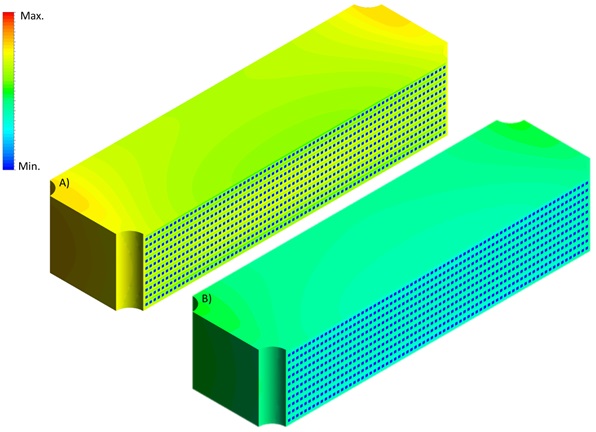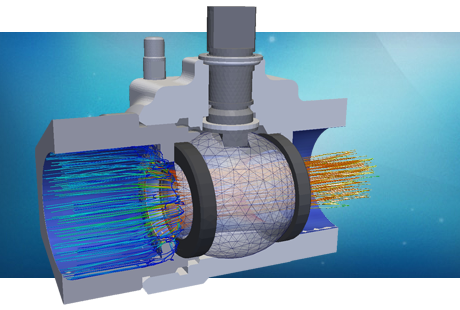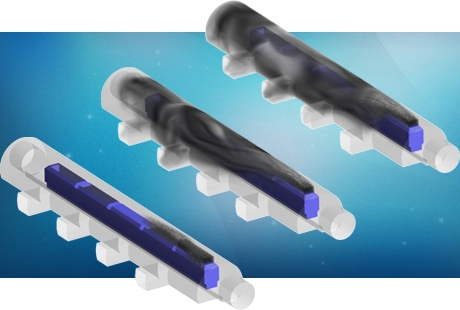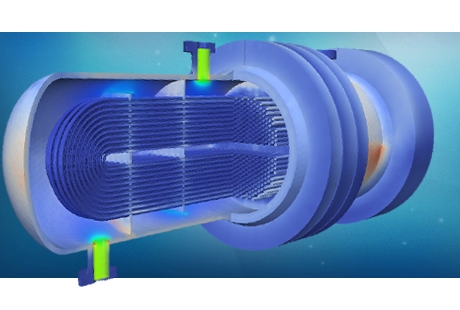Fuel cell modelling
The fuel cell technology is experiencing a major revolution powered by the constant advances in material science and manufacturing. The largest markets for fuel cells today are in stationary power, portable power, auxiliary power units, backup power and material handling. In addition, major automotive companies have been developing fuel cell vehicles (FCV), Hyundai and Toyota have recently introduced their FCVs in the marketplace. The Fuel Cell Industry Review 2015, elaborated by E4Thech, estimates a worldwide fleet of 35,000 vehicles carrying 4 GW of fuel cell power by 2020.

While fuel cells are becoming competitive in a few markets, commercialisation can be greatly expanded with improvements in durability, performance and cost reductions. To achieve these goals CFD techniques can be applied to fuel cell systems in order to predict performance, identify inefficiency problems and suggest optimisation routes. PRE Technologies have very relevant experience in CFD analysis for different fuel cells systems (cell level and stack level). Using advanced CFD tools in conjugation with mass and heat transport and electrochemical kinetics we are able to develop multiphysics simulations to optimise different fuel cell components (flow field, gas diffusion layer, catalyst layer, and electrolyte) and operational conditions (temperature, fuel to oxidant ratio, pressure, humidity, and cell orientation). In addition, FEA simulations are also within our capabilities to mitigate problems related with thermal and mechanical stress. Please visit our fuel cell modelling white paper page for more information on our capabilities.
Technical challenges
The efficiency and environmental advantages of fuel cells have been demonstrated over the last decades, but it is still a challenge meeting the cost, durability and performance of incumbent technologies. These issues are directly related with a list of well-known technical barriers. In order to mitigate and overcome some of these technical barriers PRE Technologies can offer a wide range of services, from CFD analysis to optimise the reactants flow through the flow channels to complex multiphysics analyses to investigate the impact of kinetic parameters (i.e. exchange current density, catalyst loading, activation energy, etc.) on cell performance.
Durability

Fuel cells have not yet demonstrated a level of durability acceptable for the main application areas of transportation and stationary power generation. In these applications, realistic operating conditions can include impurities in the fuel and air, start-up and shut-down operations, freezing and thawing, humidity and complex load cycles. These real-life loads result in mechanical stresses and affect the chemical stability of the fuel cell materials, components, and interfaces. To address some of these problems, multiphysics simulations with the addition of degradation models for the electrolyte and electrode can be applied to predict the performance after a specific number of cycles.
The operating temperatures required for high-temperature fuel cells, especially for stationary applications, place stringent durability requirements on materials and components, including the separator, electrolyte, electrolyte support, and electrode. Thermal analysis linked with thermal stress studies can anticipate failure in the components subjected to high thermal gradients, this is particularly relevant during start-up and transient operation.
Cost
To make fuel cell stacks competitive, materials and manufacturing costs need to be reduced. This point is especially relevant for PEMFCs which traditionally use platinum based catalysts. One way to reduce the catalyst loading while keeping the same performance is improving the effective use of the catalyst nanoparticles. CFD in combination with reconstruction methods can be used to model the microstructure of the catalyst layers with the aim of optimising the flow distribution inside these structures. Flow optimisation means more molecules of reactants in contact with the catalyst, therefore higher performance can be achieved using less catalyst.
Fuel cell performance optimisation
Cell
Fuel cell performance depends on a variety of interconnected factors, such as, electrochemical kinetics, ionic conductivity, interfacial contact resistance, flow distribution, etc. The relationship between these factors is extremely nonlinear which makes extremely complex to predict performance and optimise each parameter through traditional methods. PRE Technologies have been developing a wide variety of tools to perform sensitivity analyses for these parameters. These tools are based on multiphysics models which describe the electrochemical kinetics in detail and all parameters are input as a function of temperature, pressure and reactants concentration. CFD-based sensitivity analysis is an essential tool to ensure lower cost and enhanced durability while performance is improved.
Stack water management

Low temperature PEMFCs produce high quantities of liquid water in the cathode during operation. This water excess needs to be removed to avoid flooding, i.e. water blockage and mass transport limited performance, mainly at high current densities. On the other hand this kind of fuel cells depends on hydrated membranes to conduct protons from the anode to the cathode, therefore membrane’s drying out is a serious problem that must be avoided. Thus, an effective management of the produced water in the fuel cell stack is needed to keep high performance over the full operation temperature range. CFD can be an important tool to optimise the water management inside the stack by testing and improving the gas flow fields and gas diffusion layers design. PRE Technologies has vast experience in solving multi-phase flow problems, which has been applied to improve the water transport through the micro channels and porous media within PEMFC stacks. Please visit our fuel cell modelling white paper page for more information on water management.
System thermal management
A distinctive challenge with fuel cells systems, from the thermal management perspective, is that the majority of the produced heat must be absorbed by the cooling system. In addition, for low temperature fuel cells the operating temperature is close to the ambient temperature, which is hardly dissipated using conventional heat exchangers. For this reason, more efficient heat recovery systems, improved system designs, advanced heat exchangers are needed. PRE Technologies can help with the analysis of a wide variety of heat exchangers and the study of the entire cooling circuit (pipelines, pumps, fans, etc.).
System air management
Compressors and expanders must be designed specifically to meet the stringent requirements of size and cost for fuel cell systems. We have helped our clients optimise the design of these components and streamline their integration within the full fuel cell system to minimise parasitic power consumption.
Transient operation

During operation the fuel cell system is subjected to countless thermal and power cycles, especially in transport applications. Additionally, the exposure to vibration becomes a crucial factor in these applications. CFD and FEA analysis can be very useful to address these issues. PRE Technologies have developed a robust methodology to predict the systems useful life when subjected to cyclical loading. A transient CDF analysis is carried out to capture the thermal behaviour of the system with time and pressure oscillations. The pressure and temperature maps can then be used within the FEA platform to predict problems related with thermally induced stresses.
Fluctuating pressure can be an important concern if the natural frequencies of the system match the vortex shedding frequency. In that case, flow induced vibrations (FIV) can lead to unanticipated mechanical failure. Additionally, acoustic analysis can also be performed to account for acoustic induced vibration (AIV). FIV and AIV, if not addressed can lead to fatigue failure, which will ultimately cause reduced performance and, in certain instances, more serious problems like hydrogen leakage.
Please visit our fuel cell modelling white paper page for more information on our capabilities for this sector.
For more information on other services for fuel cell optimisation, please go to the fuel cell modelling tab or contact us here.
Our services for this sector
Fuel cell durability
- Load cycle modelling: Thermal stress and fatigue FEA analysis
- Cell start-up and shut-down study: CFD transient analysis
- Water freezing and thawing CFD modelling
- High temperature fuel cell thermal analysis: CFD and FEA based stress and creep calculation
Fuel cell performance
- Electro-chemical kinetics CFD models
- Flow distribution and reactants concentration analysis
- Cathode water management study: Flooding, blockage and membrane drying
- Gas diffusion layer fluid dynamics optimisation
- Thermal management and recovery: Heat exchanger analysis
- Compression and expander systems optimisation







